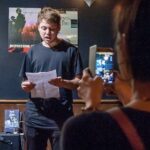Autism and anorexia – the difference a diagnosis makes
Autism explained all the quirks Hannah loathed herself for, and why she felt she didn't fit in no matter how hard she tried.

Autism and anorexia – the difference a diagnosis makes
If I had not realised I am Autistic and received an official diagnosis, I would likely be dead – “or worse, expelled!” My anorexia nervosa was fuelled by a deep and desperate yearning to be thin. This yearning was partially driven by knowing that, in our fat-phobic society, being thin would make my socially awkward, weird self more acceptable and less likely to be ostracised or bullied.
I had always felt different from others, but until I was about 10 years old, I viewed this difference as a positive. Then things changed, gradually but quickly, and the status quo no longer accepted my quirks. Friendly laughter became mocking; my differences were highlighted and rejected.
From then on, I did my best to fit in, fearing being excluded because of my oddities. I observed what others did and tried to do the same, but I always seemed to fall short. For example, everyone who wasn’t an outcast started to wear ankle socks.
I desperately wanted ankle socks, too, but I knew Mum and Dad would think I was trying to be cool if I asked for some – and, to be fair, I was. Instead, I folded my socks down so they ended at my ankle. Others noticed and mocked, “Did you roll your socks down?” One friend teased me for altering my socks to “fit in with the cool girls, ooh!”
My mind froze when it was my turn to speak
I tried to fit in socially but always seemed to say the wrong thing. It didn’t help that I was so nervous that my mind froze when it was my turn to speak. I couldn’t think of anything interesting or funny to say to make everyone think I was cool or, at least, not a dorky loser. However hard I tried, others saw, through my sheer facade of normalcy, the boring, nerdy, good two shoes at my core.
I vowed to do things differently in high school, where I would know no one from primary school. I paid close attention to the social hierarchy of my year group and my position on the ladder.
Only a week into the first term, the “popular group” was forming, and I hadn’t made friends with anyone. As in primary school, I tried to be witty when these self-proclaimed royals were around so they might notice and invite me to join their elite club.
My social ‘ranking’ in friendship groups slipped
My attempts to “belong” always failed, leaving me embarrassed after publicly making a fool of myself. My social “ranking” continued to slip until I settled into a friendship group that I knew was second from the bottom, just above the cruelly dubbed “loser group.”
I never questioned if it was fair for others to treat me as a lesser person simply because I didn’t keep up with fashion and pop culture and always seemed to say the wrong thing. Instead, I blamed myself and vowed to do better. After a year or two, I was too tired to keep trying – I also had chronic fatigue syndrome. My efforts always seemed to backfire anyway. I stopped raising my hand to answer questions in class and was often too embarrassed to ask teachers for verification if I didn’t understand something.
Food restriction was something I could do to improve my chances
When I was 15, I started restricting my food with a deliberate intent to lose weight. A mess of trauma, self-hatred and misguided thinking led to this decision. However, two beliefs were the driving force:
- Even though I was an awkward, weird loser, being thin would make me more acceptable as a person to others (so would being pretty, but I seemed to fail at that too, whereas losing weight was a simple equation of eating less and exercising more);
- Eating less, only eating healthy food and eating slowly, would make me look more dainty and less disgusting inside and out.
Two years later, I was admitted to a mental health ward, where I was “treated” for anorexia nervosa. Ten years later, I was struggling to turn around yet another eating disorder relapse as the world awaited a magic vaccine for COVID-19.
Genetic link between anorexia nervosa and autism
I had learnt about the genetic link between anorexia nervosa and Autism a few years earlier, and friends sometimes commented on my Autistic traits. However, I had also read that Autistic people don’t feel empathy, and I do. I messaged a friend who had been diagnosed Autistic a few years earlier but is empathetic, asking if they could resolve my confusion. They responded with long, detailed texts and links to websites and YouTube videos.
The more I read, the more I believed I was Autistic. I felt a jolt of excitement whenever I read or heard something I identified with, and I feared I was an imposter if I read about an Autistic trait I hadn’t experienced.
Autism quickly became a special interest as my parents and I educated ourselves. It was the missing piece of the puzzle. It explained the chronic fatigue syndrome, the acute colic I had as a baby, the strength of the eating disorder’s grip, and why I felt that I didn’t quite fit in, no matter how hard I tried.
Autism explained all the quirks I loathed myself for
Autism explained all the quirks I loathed myself for, including my inability to change or hide them from others. It explained why conversations were awkward and jilted with most people, even when I exhausted myself trying to guess what I was expected to say and do, but natural and easy with others—I realised the latter group, like me, were usually neurodivergent.
However, I worried that I wasn’t actually Autistic or that, as a girl, the assessing psychiatrist wouldn’t identify enough Autistic traits to qualify for a diagnosis. I was 95 per cent sure I was, but after almost 20 years of bad news and ineffective or traumatic treatment, it seemed too good to be true. I needed official validation before I could stop hating myself and instead accept my peculiarities and even embrace and celebrate them.
In one of Billy Connolly’s stand-up shows, he tells a story about a young boy who has trouble reading. The boy is assessed for dyslexia, after which the assessor announces: “You’re not Dyslexic; you’re just stupid!” For some reason, our family found the combination of that story and Billy’s accent as he delivered the punch line hilarious. We often quote it when one of us does something silly. I worried that if I was not Autistic, the line would instead be, “You’re not Autistic; you’re just socially awkward.” I would have no excuse for my failure to fit in with society.
I was almost 30 when my diagnosis was confirmed
I was almost 30 when my diagnosis was confirmed. The diagnosis, made after two inexperienced clinicians “failed” my first assessment, was a day of celebration. I had a tangible, biological explanation for the unsettling feeling that I was profoundly different at my core. It explained my inability to fit into society and all the little harmless quirks I knew I needed to hide from all but my closest friends to avoid negative judgment.
In a kinder, more understanding world, I wouldn’t need the validation of a formal diagnosis to feel comfortable being different, but such is life. The diagnosis permits me to embrace my differences instead of apologetically hiding them. I joke with friends and family when I say typically Autistic things, spend hours creating artwork based on my special interests, miss social cues, and when another close friend gets an Autism or ADHD diagnosis – birds of a feather….
Embracing my differences, such as my “childish” enjoyment of fantasy worlds and art, has brought true joy. They are gradually reclaiming the brain space that was previously inhabited by thoughts of body size, weight, calories and exercise.
I am not weird; I am different; I am neurodivergent (and that’s okay)
At 32, I continue to find socialising with most neurotypicals exhausting and stressful, but now I understand why. It’s not because I’m weird; it’s because we are different. In the same way, people from different cultures may have trouble communicating smoothly. Now, because I have stopped loathing myself for my inability to be “normal,” I don’t care so much about what others think. And when I’m with my neurodivergent friends, it’s easy.
While the Autism diagnosis was not an instant cure for my anorexia nervosa, it washed away half the reasons I hated myself. I have a long way to go to loosen and hopefully relinquish my food rules, unlearn my internalised fat-phobia, and hopefully achieve true body neutrality.
I am far from being recovered, but I am afraid to think where I would be now if I hadn’t realised I am Autistic.
- In my writing, as in life, I refer to myself as an Autistic person. However, I have always hated being labelled “anorexic.” I was never anorexic; rather, I had a horrible illness called anorexia for a horrible period of my life. Conversely, Autism is literally in my genetic code, and it defines me as a person. Some people prefer to use person-first language – “I have Autism” – because they don’t feel defined by their Autism. I prefer identity-first language – “I am Autistic” – because being Autistic is a huge part of who I am, and I am proud of that.
Gesi, C., Carmassi, C., Luciano, M., Bossini, L., Ricca, V., Fagiolini, A., & Dell’Osso, L. (2017). Autistic traits in patients with anorexia nervosa, bulimia nervosa or binge eating disorder: A pilot study. European Psychiatry, 41(S1), S100. https://doi.org/10.1016/j.eurpsy.2017.01.310
Tchanturia, K., Adamson, J., Leppanen, J., & Westwood, H. (2019). Characteristics of autism spectrum disorder in anorexia nervosa: A naturalistic study in an inpatient treatment programme. Autism: The International Journal of Research and Practice, 23(1), 123–130. https://doi.org/10.1177/1362361317722431
Westwood, H., & Tchanturia, K. (2017). Autism spectrum disorder in anorexia nervosa: An updated literature review. Current Psychiatry Reports, 19(7), 41. https://doi.org/10.1007/s11920-017-0791-9
Zhang, R., Birgegård, A., Fundín, B., Landén, M., Thornton, L. M., Bulik, C. M., & Dinkler, L. (2022). Association of autism diagnosis and polygenic scores with eating disorder severity. European Eating Disorders Review: The Journal of the Eating Disorders Association, 30(5), 442–458. https://doi.org/10.1002/erv.2941





